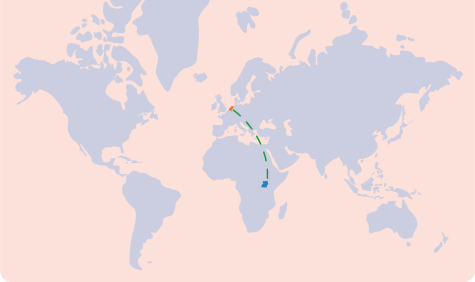Working together to scale up in Uganda
For Uganda's RENU, eduroam was the game changer. This NREN has big plans for it. In Uganda, you encounter the future everywhere. Because no country in the world has a younger population: as many as half of its 50 million inhabitants are under 16. And its surface area is six times the Netherlands. So providing Ugandan educational institutions with Internet is quite a job for RENU.
The NREN has been performing this task since it was established in 2006 by the universities and major research institutes. "What they wanted above all was connectivity," says Nicholas Mbonimpa, CEO of RENU. "And that connectivity had to be both affordable and reliable."
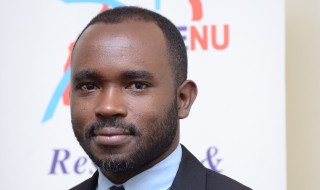
Nicholas Mbonimpa, CEO of NREN RENU in Uganda
He says RENU succeeded well: "Over time, the national telecommunications regulator even requested us to start serving the rest of the education sector too." So for example, RENU now provides internet to more than 200 secondary schools in Uganda. But the main focus is still on academia: 88 university campuses, 454 research sites and 9 hospitals.
That is also where the bulk of the funding comes from. Each member organisation pays the costs incurred by RENU for its connectivity, plus a small mark-up. "But gradually," says Nicholas, "our members took up additional paid services from us, such as cloud services. And furthermore, in recent years, money has come from abroad in the form of grants and project sponsorship."
Very happy with eduroam
Nicholas is most proud of what RENU is doing with eduroam. "We offer it through all kinds of channels, especially off-campus. Our members are very happy with that."
"Being able to offer students off-campus, affordable connectivity as well."
This success did not come right away. "We introduced eduroam in 2015. Very few institutions took it up. But then came covid-19. The government closed all educational institutions and that lasted for almost two years. Some universities started teaching online; they asked for help from us, especially to offer their students affordable connectivity off-campus."
Hotspots
RENU came up with two solutions. The first was Zero-rated Mobile Access. "We asked telecom operators to connect for free to Ugandan websites that students needed. For some institutions this proved a solution."
But the real success came with Metro eduroam. "In this, we approached service providers in the capital Kampala that had Wi-Fi infrastructure: were they willing to open up their network to students? If so, those students authenticate with eduroam and then their traffic is routed to the RENU network."
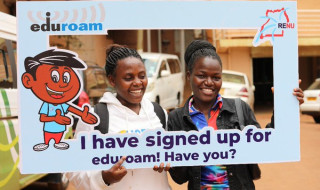
RENU introduced eduroam in 2015 and anno 2024 there are 45,000 students using the service.
The companies offered more than three hundred hotspots. And the number of educational institutions with eduroam exploded from five to more than two hundred. "Our members have really become aware of the importance of this service, also after covid-19. Last year, we had more than 45,000 students using Metro eduroam. We have an app for students to find the hotspots. And then they can go online for free."
Pocket routers
Metro eduroam worked well for students. But the staff, lecturers and researchers needed a different solution, especially during the many field surveys. ‘For them, we came up with eduroam on the Go. Essentially, that’s a pocket-sized Wi-Fi router. It connects to Uganda's nationwide 4G/5G network, using a special SIM card that connects only to the RENU network, and broadcasts Wi-Fi with authentication through eduroam.’
"This solution is very secure and convenient for users. The institution pays RENU for the cost. We have handed out more than five hundred devices so far, and it is one of our fastest growing products."
Made in Uganda
Meanwhile, despite – or rather because of – the success of Metro eduroam, RENU is not yet satisfied with this service. "As the uptake of Metro eduroam grows, the costs of delivering and maintaining the service are rising by the day. At the same time, reliability is insufficient. Sometimes that’s because of technical problems at the hotspot; at other times it’s due to network issues, especially since in deploying through other providers’ infrastructure we lack full visibility. Lastly, electricity is not always available everywhere in Uganda."
"So we started thinking. How can we scale up this network in a way that we can guarantee reliability and availability?"
"In five years, we want to have around ten thousand hotspots outside the campuses."
"That's how we came to routers with solar cells, which connect to our own network. So we can also manage them ourselves. The technology comes from an American company, but we assemble the routers and soon we will build them completely ourselves. Made in Uganda!"
RENU has big ambitions. "In five years, we want to have some ten thousand hotspots outside the campuses. But we have to be able to finance that. For this year we have already deployed two hundred solar-powered routers off-campus, with financial support from the Internet Society Foundation."
Campus Network-as-a-Service
RENU has been providing training and support for the institutions' ICT staff since 2014. "We train them in the basics of network management, cybersecurity and you name it. Occasionally, however, that’s not enough. Then we go to the institution, help them redesign the network and sometimes we even donate equipment. In all that, we received a lot of help ourselves from the Network Setup Resource Center (NSRC) at the University of Oregon."
Recently, RENU went a step further. "We noticed that a lot of things are still wrong at institutions. Sometimes the people we trained leave. Or improvement is not budgeted for. There are numerous reasons that keep the quality of the network below par."
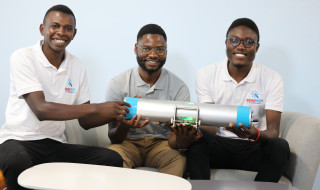
Made in Uganda! Developing own routers on solar cells
That is why RENU came up with a new offer this year: Campus Network-as-a-Service (CNaaS). "It means we manage the campus network ourselves. Sort of like SURF offers Wifi-as-a-Service."
Initial reactions are often somewhat anxious: ‘Institutions worry that their ICT departments will become irrelevant. But they still have plenty of work left. We’ve already started managing a few campus networks and those institutions are very satisfied with the results.’
Many partners in the NREN world
In this service too, RENU is working with a foreign partner, namely Norway's NREN Sikt. And the Ugandans have many more partners in the NREN world. For example the UbuntuNet Alliance, an African counterpart of Géant. And KENET, the sister organisation in neighbouring Kenya. "It's a good community, where you can learn a lot from each other."
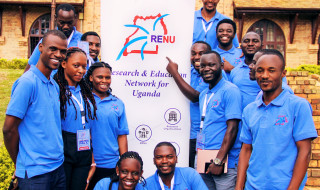
SURF has also been a valued partner, for instance in rolling out CNaaS to institutions. But the relationship between RENU and SURF goes back much further.
"When we started the RENU network in 2014, it was running on four Juniper routers that SURF had given us. Maybe they have already forgotten that at SURF. But it really helped us tremendously."
Text: Aad van de Wijngaart
Photos: RENU
'Samenwerken en opschalen in Oeganda' is een artikel van SURF Magazine.
Terug naar SURF Magazine
Vragen naar aanleiding van dit artikel? Mail naar magazine@surf.nl
